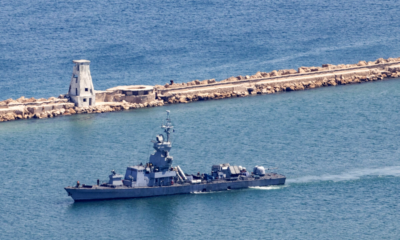
OpEds

Israel-Saudi normalisation – a mirage or a new dawn?
We’ve been hearing a lot of noise over the past few months about a potential Israel-Saudi Arabia deal, which would finally normalise relations between the two. What’s clear is that a confluence of factors are at last coming together to bring this to a speedy conclusion.
Let’s analyse how all three sides – as there are three sides to this deal namely Israel, the United States (US), and Saudi Arabia – benefit from possible normalisation:
The US
It’s obvious that the Biden administration would like to pull off a major foreign policy coup just before the 2024 presidential campaign kicks off. More importantly for the US though is the fact that Saudi Arabia has recently started to become a lot closer to China. President Xi Jinping visited the kingdom in December 2022, and the 10th Arab-China business conference was hosted by Saudi Arabia in June 2023. China, of course, also hosted the recent rapprochement between Saudi Arabia and Iran, where the two re-established diplomatic relations. A Saudi-Israel normalisation agreement would anchor Saudi Arabia securely back in the Western camp and bring it closer to the US. US-Saudi relations have long been strained, particularly after Biden called the Saudis a pariah state in his 2020 election campaign. The US bringing a major deal between Israel and the Saudis to conclusion would also show that it’s still invested in the Middle East, and it has become important for the US, as the world’s superpower, to be able to complete an even bigger deal than China in the region.
Israel
The security, economic, and diplomatic benefits for Israel in doing a deal with the richest and most influential Sunni Arab power in the Middle East are obvious. In addition, a normalisation deal might actually assist Israel with its domestic problems. The Saudis would no doubt want some guarantee from Israel on not annexing Judea and Samaria as well as not establishing any more settlements, which would doubtless prove anathema to the more right-wing elements in the Israeli cabinet. Many are predicting that this would give Bibi Netanyahu an opportunity finally to dump them and re-establish a new coalition with moderates like Benny Gantz and Gideon Sa’ar, and move his government more to the centre. This could give Bibi the space to move away from the divisive Judicial reform legislation which is so destroying Israeli society.
More importantly, and back to the diplomatic front, normalisation would be a “geopolitical game changer” for Israel, to quote many writers on the topic. Due to the Saudis’ special status in the Arab world, it would give other Arab countries cover to follow suit and initiate their own deals with Israel. Kuwait/Oman might well follow. In addition, the Saudis occupy an important leadership role in the Organization of Islamic Cooperation. A deal would open the way for other Muslim-majority countries, particularly in South-East Asia, to do the same.
Finally, and just as importantly, there’s no doubt that any normalisation deal would involve huge Saudi investment in Palestinian infrastructure in the West Bank, as well as a large aid deal to the Palestinian Authority. This would create employment and opportunities for local Palestinians.
The Saudis
Though the Saudis don’t trust the US’s staying power in the Middle East and would like to establish an alliance with Israel, the regional power, to support them against their many enemies in the region, there’s no doubt they would want a lot more to finalise a normalisation deal. Ironically, they would probably want more from the US than they do from Israel. According to many recent articles, the Saudis would want a security treaty with the US, obliging it to come to their aid if attacked. They also probably would require the US to back a civilian nuclear programme, which would help their leadership in their quest to wean the kingdom off its oil dependency, as well as sell them advanced weapons such as missile defence systems and, according to many newspaper articles, the F-35 fighter jet.
Why is now suddenly a good time for a deal?
All three parties have realised that time is running out. From 2024, the US presidential campaign will be in full swing, with little time and effort left for the Biden administration to commit to concluding a deal.
More importantly, if the US is to provide the Saudis with a formal security treaty, this needs to be ratified by the US Senate. Many commentators agree that if Biden brings such a treaty to the Senate now, the Democrats would probably support it, whatever their misgivings, so as to give their president a foreign policy boost going into the election campaign. A majority of the Republicans should probably as well, given what such a treaty would do for Israel, which the majority support. However, if such a treaty were ever to be brought in future by a Republican president, even though this would be less likely given their desire to be less committed to the Middle East, there’s a good chance the majority of Democratic senators wouldn’t support it due to their views on the Saudi human rights record – and some aren’t supporters of Israel either.
What could go wrong?
This is by no means a done deal. With a complex three-party agreement such as this one, a lot can go wrong from all three sides.
The US might balk at the prospect of giving the Saudis a security guarantee as well as advanced weaponry, and Biden might well not get any deal through the Senate. A combination of Democrats opposed to the Saudis’ human rights record and Republicans wanting the US to pivot away from the Middle East and focus more on Asia might scupper the deal. On the Israeli side, the purported concessions they will have to make in the territories might prove too much for Bibi, and even if he is happy to accept them, there’s a fair chance the more right-wing elements in his cabinet might not be. If the Israeli government falls over this, it would only delay and impede any progress. Then, of course, there’s fear in Israel about any Saudi nuclear programme, even if only civilian, as well as the advanced weaponry the Saudis will want. The Saudis, for their part, might decide that what they stand to gain from any deal isn’t enough to make them commit, given that they already enjoy some military ties with Israel, although these are “in the shadows”. Particularly if the US refuses/is unable to grant them a full security treaty, they might think that they are giving up too much and getting too little in return.
Deals of this nature are complex at the best of times. Add in the fact that this one involves three parties, each with their own interests; a looming US presidential election; a coalition government in Israel which might not survive the required concessions; a Saudi government with high demands and expectations; and the agreement just got a whole lot more complex. The prospects of a deal are still good given the benefits to all three sides, but don’t bring out the (kosher) champagne just yet!
- Harry Joffe is a Johannesburg tax and trust attorney.










